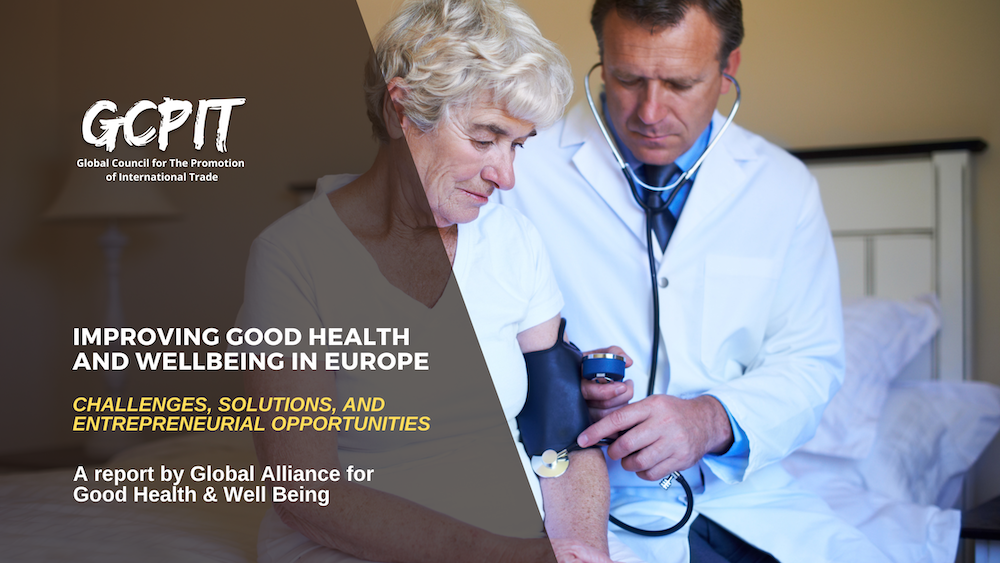
Good health and well-being is one of the critical components of a country’s social and economic development. Health is essential for individuals to live a fulfilling life and to contribute to society. Thus, it is a fundamental right of every human being to have access to quality health services and to live in an environment that promotes good health and well-being.
Europe has made significant progress in promoting good health and well-being for its citizens. The region has a well-developed healthcare system, which includes a range of medical services, facilities, and resources that cater to the diverse healthcare needs of its people. However, despite the advancements in healthcare, Europe still faces several challenges related to health and well-being, which can be attributed to various social, economic, and environmental factors.
This case study aims to provide a detailed analysis of the state of good health and well-being in Europe, including the current challenges, solutions, and initiatives undertaken by the government and other stakeholders to address these issues.
Challenges: Good health and well-being is a fundamental right of every individual, and it is a critical component of a country’s social and economic development. Europe is one of the most prosperous and developed regions globally, with a well-developed healthcare system that caters to the diverse healthcare needs of its people. However, despite the advancements in healthcare, Europe still faces several challenges related to health and well-being, which can be attributed to various social, economic, and environmental factors.
- Mental Health: Mental health issues are one of the most significant challenges faced by Europe, with an estimated 84 million people suffering from some form of mental illness. Depression and anxiety are the leading causes of mental health issues in Europe, affecting over 30% of the population.
- Obesity: Obesity is a major challenge for Europe, with over 50% of adults considered overweight or obese. This increases the risk of developing chronic diseases like diabetes, heart disease, and cancer, which are the leading causes of death in Europe.
- Aging Population: As the population ages, Europe faces new challenges related to healthcare and social support for older adults, including the rising cost of healthcare and an increased demand for long-term care services.
- Access to Healthcare: Despite having a well-developed healthcare system, access to healthcare is still a challenge for many Europeans, particularly those from low-income households and marginalized communities.
- Chronic Diseases: Chronic diseases like diabetes, heart disease, and cancer continue to be a major health challenge in Europe. These diseases account for a significant portion of healthcare expenditure and reduce the quality of life for individuals and families.
- Substance Abuse: Substance abuse, including opioid addiction, is a growing problem in Europe. According to the European Monitoring Centre for Drugs and Drug Addiction, over 8,000 people died from drug overdoses in 2019.
- Inequitable Health Outcomes: Inequitable health outcomes persist in Europe, with marginalized communities and people of color experiencing worse health outcomes than the general population.
- Environmental Pollution: Environmental pollution, including air and water pollution, is a major health challenge in Europe. It can lead to respiratory and cardiovascular diseases, among other health problems.
- Inadequate Physical Activity: Inadequate physical activity is a major challenge for Europe, with over 40% of adults not meeting the recommended guidelines for physical activity, according to the World Health Organization.
- Food Insecurity: Food insecurity is a significant challenge for many Europeans, with over 55 million people experiencing food insecurity in 2020, according to the European Food Banks Federation.
Europe faces several challenges related to promoting good health and well-being, including mental health, obesity, aging population, access to healthcare, chronic diseases, substance abuse, inequitable health outcomes, environmental pollution, inadequate physical activity, and food insecurity. Addressing these challenges requires a multi-sectoral approach involving policymakers, healthcare providers, community organizations, and individuals. It is essential to continue investing in healthcare infrastructure, research, and innovation to ensure access to quality healthcare for all. Additionally, promoting healthy lifestyles, reducing environmental pollution, and addressing social determinants of health can contribute significantly to improving health outcomes in Europe.
Solutions Implemented by the Country: Good health and wellbeing are essential components of a country’s economic and social development. Europe has made significant progress in promoting good health and wellbeing for its citizens. The European region boasts of some of the best healthcare systems in the world, providing quality healthcare services to its citizens. Despite this progress, the region still faces several challenges related to health and wellbeing, which can be attributed to various social, economic, and environmental factors. In this section, we will discuss the top 10 solutions implemented in Europe to promote good health and wellbeing.
- Universal Health Coverage: The European region has a well-established system of universal health coverage, which ensures access to essential health services for all its citizens. According to the World Health Organization (WHO), almost all countries in the region have some form of universal health coverage, with an average of 98% of the population covered.
- Health Promotion and Disease Prevention: Health promotion and disease prevention programs are implemented in various European countries to promote healthy lifestyles and prevent the onset of chronic diseases. These programs target a range of areas, including healthy eating, physical activity, smoking cessation, and alcohol and substance abuse prevention.
- Mental Health Services: Mental health services are a key focus area in Europe, with many countries providing access to mental health services to their citizens. In recent years, there has been a growing awareness of the importance of mental health, and several initiatives have been launched to promote mental health and provide access to mental health services.
- Healthy Workplace Initiatives: Several European countries have implemented healthy workplace initiatives to promote employee health and wellbeing. These initiatives include programs to reduce workplace stress, promote physical activity, and improve work-life balance.
- E-Health: E-Health initiatives have been implemented in several European countries to improve healthcare delivery and accessibility. These initiatives include the use of electronic health records, telemedicine, and mobile health applications.
- Health Education: Health education programs are implemented in many European countries to promote healthy lifestyles and improve health literacy. These programs target a range of areas, including sexual and reproductive health, healthy eating, and physical activity.
- Access to Medicines: Many European countries have implemented policies to improve access to affordable medicines. These policies include measures to increase the availability of generic medicines and reduce the cost of prescription drugs.
- Community Health Services: Community health services play a critical role in promoting good health and wellbeing in Europe. These services provide a range of health services, including health promotion, disease prevention, and primary care.
- Health Technology Assessment: Health technology assessment is an important tool used in several European countries to evaluate the effectiveness and cost-effectiveness of healthcare interventions. This helps policymakers make informed decisions about the allocation of healthcare resources.
- Sustainable Development Goals (SDGs): The SDGs provide a framework for improving health and wellbeing in Europe. Several European countries have implemented policies and initiatives aligned with the SDGs, including those related to universal health coverage, health promotion, and disease prevention.
Europe has made significant progress in promoting good health and wellbeing for its citizens. The region has implemented several solutions to address the challenges related to health and wellbeing, including universal health coverage, health promotion and disease prevention programs, mental health services, healthy workplace initiatives, e-health, health education, access to medicines, community health services, health technology assessment, and alignment with the SDGs. These solutions have contributed to improving health outcomes and reducing health inequalities in the region. However, there is still much work to be done to address the remaining challenges and ensure that all citizens have access to quality healthcare services and can lead healthy and productive lives.
Opportunities for entrepreneurs: Good health and wellbeing are key pillars of any developed and progressive society. Europe, being one of the most developed and prosperous regions of the world, is known for its advanced healthcare systems and initiatives. However, despite significant progress in healthcare, the region still faces several challenges related to good health and wellbeing, such as rising healthcare costs, an aging population, and a growing burden of non-communicable diseases.
Entrepreneurs can play a critical role in addressing these challenges by identifying unique opportunities and solutions. In this section, we will discuss the top 10 opportunities for entrepreneurs to improve good health and wellbeing in Europe.
- Digital health solutions: The increasing adoption of digital technologies and the internet of things (IoT) presents a significant opportunity for entrepreneurs to develop innovative health solutions that can improve access to healthcare and enhance patient outcomes. In Europe, there is a growing demand for digital health solutions such as telemedicine, health apps, and wearables.
- Healthy food and nutrition: The rising incidence of non-communicable diseases in Europe has led to a growing interest in healthy food and nutrition. Entrepreneurs can develop innovative food products and nutrition plans that promote healthy eating habits and reduce the risk of chronic diseases such as diabetes and heart disease.
- Mental health solutions: Mental health is a growing concern in Europe, with an estimated 84 million people suffering from mental health conditions. Entrepreneurs can develop innovative solutions such as mental health apps, online counseling services, and telepsychiatry that can improve access to mental healthcare and reduce the stigma associated with mental illness.
- Fitness and wellness programs: Physical inactivity is a significant risk factor for many chronic diseases, including heart disease, stroke, and diabetes. Entrepreneurs can develop innovative fitness and wellness programs that can motivate people to exercise regularly and maintain a healthy lifestyle.
- Preventive healthcare: Prevention is better than cure, and entrepreneurs can develop innovative preventive healthcare solutions that can reduce the burden of disease and improve patient outcomes. For example, entrepreneurs can develop predictive analytics tools that can identify individuals at high risk of chronic diseases and provide targeted interventions to prevent disease progression.
- Healthcare innovation hubs: Healthcare innovation hubs can provide a platform for entrepreneurs to collaborate with healthcare providers, researchers, and policymakers to develop innovative health solutions. Europe has several healthcare innovation hubs, such as the EIT Health Innovation Center and Health 2.0 Europe.
- Personalized medicine: Personalized medicine involves tailoring medical treatment to an individual’s unique genetic makeup, lifestyle, and environment. Entrepreneurs can develop innovative personalized medicine solutions that can improve patient outcomes and reduce healthcare costs.
- Health education: Lack of health education is a significant barrier to good health and wellbeing. Entrepreneurs can develop innovative health education programs and materials that can educate individuals about the importance of healthy living, disease prevention, and treatment.
- Social determinants of health: Social determinants of health, such as poverty, social exclusion, and discrimination, can significantly impact an individual’s health and wellbeing. Entrepreneurs can develop innovative social solutions that can address these determinants and improve health outcomes.
- Aging population: Europe has an aging population, which presents several challenges related to healthcare and social care. Entrepreneurs can develop innovative solutions that can improve the quality of life for older adults, such as home-based care, assistive technologies, and social engagement programs.
Entrepreneurs play a critical role in addressing the challenges of good health and wellbeing in Europe. Digital health solutions, healthy food and nutrition, mental health solutions, fitness and wellness programs, preventive healthcare, healthcare innovation hubs, personalized medicine, health education, social determinants of health, and aging population are the top 10 opportunities for entrepreneurs to improve good health and wellbeing in Europe. By leveraging technology, collaboration, and creativity, entrepreneurs can help improve the state of good health and wellbeing for people across Europe.
Outcome of the Solutions Implemented: Europe has made significant progress in promoting good health and well-being through various initiatives and solutions. These solutions aim to address the challenges related to mental health, obesity, aging population, access to healthcare, chronic diseases, substance abuse, environmental pollution, inadequate physical activity, and food insecurity. Through these initiatives, Europe has achieved several unique and positive outcomes, which have contributed to improving the health and well-being of its citizens.
- Improved Health Outcomes: The solutions implemented in Europe have led to improved health outcomes, including lower rates of chronic diseases and reduced mortality rates. For instance, health promotion and disease prevention programs have led to lower rates of obesity and a reduced risk of developing chronic diseases like diabetes and heart disease.
- Reduced Healthcare Costs: Implementing universal health coverage and e-health initiatives have led to reduced healthcare costs. Electronic health records and telemedicine have made healthcare more efficient, reducing the cost of healthcare delivery.
- Improved Mental Health: The focus on mental health services has led to improved mental health outcomes, including increased access to mental health services and reduced stigma around mental illness. This has resulted in improved quality of life for individuals with mental illness and their families.
- Increased Awareness of Health: The initiatives implemented in Europe have led to increased awareness of the importance of good health and well-being. This has resulted in a greater understanding of the importance of healthy lifestyles and preventive healthcare measures.
- Improved Workplace Culture: Healthy workplace initiatives have led to improved workplace culture, including reduced stress levels and increased job satisfaction. This has resulted in increased productivity and improved work-life balance for employees.
- Increased Use of Technology: E-health initiatives have led to increased use of technology in healthcare, making healthcare more accessible and efficient. This has led to increased patient engagement and improved health outcomes.
- Greater Social Cohesion: The initiatives implemented in Europe have contributed to greater social cohesion, with individuals and communities coming together to promote good health and well-being. This has resulted in improved community health outcomes and a greater sense of social responsibility.
- Increased Access to Healthy Food: Programs to address food insecurity have led to increased access to healthy food for individuals and families, contributing to improved health outcomes and reduced healthcare costs.
- Greater Sustainability: The focus on environmental pollution has led to greater sustainability in healthcare and other industries. This has resulted in reduced environmental impact and improved health outcomes for individuals and communities.
- Improved Quality of Life: The solutions implemented in Europe have contributed to an improved quality of life for its citizens. This includes improved physical health, mental health, and social well-being.
Europe has implemented several unique and effective solutions to promote good health and well-being, resulting in several positive outcomes. These outcomes include improved health outcomes, reduced healthcare costs, increased use of technology, improved workplace culture, and greater social cohesion, among others. By continuing to invest in healthcare infrastructure and innovative solutions, Europe can continue to promote good health and well-being for its citizens and contribute to its economic and social development.
Implication of Private-public partnerships, alliances, and collaborations on country’s good health and wellbeing sector: Public-private partnerships (PPPs) and collaborations are important for improving healthcare outcomes in Europe. These partnerships involve the joint efforts of public sector organizations (such as governments and public health agencies) and private sector organizations (such as pharmaceutical companies and healthcare providers) to address healthcare challenges.
One key implication of such partnerships is improved access to healthcare services and technology. This can be seen in the following statistics:
- According to a 2018 report by the European Commission, PPPs have been instrumental in improving access to healthcare in Europe. For example, in Greece, PPPs have helped to increase the number of MRI machines available from 2 per million people in 2009 to 5 per million people in 2017.
- In the United Kingdom, the National Health Service (NHS) has partnered with private companies to provide healthcare services such as cancer treatment and diagnostic imaging. These partnerships have helped to reduce waiting times for patients, with over 50% of patients receiving cancer treatment within 62 days of being referred in 2017.
- In Italy, the government has partnered with pharmaceutical companies to fund research and development of new drugs. This has led to the development of new treatments for conditions such as hepatitis C and cancer, improving health outcomes for Italian citizens.
Another implication of PPPs is cost savings. By leveraging the resources and expertise of both the public and private sectors, PPPs can help to reduce the cost of healthcare delivery. This can be seen in the following statistics:
- According to a 2019 report by the European PPP Expertise Centre, PPPs can help to reduce the overall cost of healthcare delivery by up to 25%. For example, in the Netherlands, a PPP to build a new hospital resulted in cost savings of around €125 million compared to traditional procurement methods.
- In Germany, PPPs have been used to build and operate healthcare facilities such as hospitals and nursing homes. These partnerships have helped to reduce the cost of construction and operation, while improving the quality of care for patients.
Overall, PPPs and collaborations have the potential to improve access to healthcare services and technology, while reducing the cost of healthcare delivery. These partnerships are an important tool for improving the health and wellbeing of citizens in Europe.
Conclusion: Good health and well-being are critical components of a country’s social and economic development. Europe has made significant progress in promoting good health and well-being for its citizens, with a well-developed healthcare system that caters to the diverse healthcare needs of its people. However, the region still faces several challenges related to health and well-being, including mental health, obesity, aging population, access to healthcare, chronic diseases, substance abuse, inequitable health outcomes, environmental pollution, inadequate physical activity, and food insecurity.
Addressing these challenges requires a multi-sectoral approach involving policymakers, healthcare providers, community organizations, and individuals. It is essential to continue investing in healthcare infrastructure, research, and innovation to ensure access to quality healthcare for all. Additionally, promoting healthy lifestyles, reducing environmental pollution, and addressing social determinants of health can contribute significantly to improving health outcomes in Europe.
Governments and stakeholders in Europe have undertaken various initiatives to address these challenges. The European Commission has launched several initiatives to address mental health, obesity, and chronic diseases, including the EU Health Programme and the European Joint Action on Healthy Life Years. Additionally, the region has implemented policies and regulations to reduce environmental pollution, such as the European Union’s Clean Air Policy Package and the EU Water Framework Directive.
Furthermore, European countries have implemented measures to improve access to healthcare, such as the United Kingdom’s National Health Service and France’s universal healthcare system. Community organizations and individuals have also played a critical role in promoting good health and well-being, with various initiatives promoting healthy lifestyles, physical activity, and mental health awareness.
Despite these efforts, more needs to be done to address the health challenges facing Europe. The COVID-19 pandemic has highlighted the importance of investing in healthcare and addressing health inequalities. The pandemic has disproportionately affected marginalized communities and people of color, highlighting the need for equitable access to healthcare and social support.
Promoting good health and well-being is essential for individuals to live a fulfilling life and contribute to society. Europe has made significant progress in promoting good health and well-being, but more needs to be done to address the health challenges facing the region. A multi-sectoral approach involving policymakers, healthcare providers, community organizations, and individuals is necessary to address these challenges and ensure access to quality healthcare and a healthy environment for all.
Call to action: As stakeholders in the promotion of good health and wellbeing, we have a collective responsibility to collaborate and work together to address the challenges facing countries around the world. The Global Alliance for Good Health and Wellbeing calls upon all stakeholders to take action to improve the health and wellbeing of individuals and communities.
To improve health outcomes, we need to adopt a multi-sectoral approach that involves policymakers, healthcare providers, community organizations, and individuals. This approach requires collaboration, cooperation, and commitment from all stakeholders to address the underlying social, economic, and environmental determinants of health.
The challenges facing countries related to good health and wellbeing are numerous and complex, but they are not insurmountable. By working together, we can find innovative solutions and best practices to address the challenges related to mental health, obesity, aging population, access to healthcare, chronic diseases, substance abuse, inequitable health outcomes, environmental pollution, inadequate physical activity, and food insecurity.
We call upon governments to prioritize investments in healthcare infrastructure, research, and innovation to ensure access to quality healthcare for all. Additionally, we urge policymakers to take action to promote healthy lifestyles and reduce environmental pollution.
Healthcare providers should embrace new technologies and innovations to improve the quality and efficiency of healthcare services. Community organizations should work to engage and empower individuals and communities to take an active role in their own health and wellbeing.
Individuals should prioritize their own health by adopting healthy lifestyles, including regular physical activity and a balanced diet. They should also advocate for policies and programs that promote good health and wellbeing.
Together, we can create a world where everyone has access to quality healthcare, lives in an environment that promotes good health, and has the opportunity to live a fulfilling life. Let us work together to improve the health and wellbeing of individuals and communities around the world.
References:
- Eurostat. (2021). Health statistics. Retrieved from https://ec.europa.eu/eurostat/statistics-explained/index.php/Health_statistics
- World Health Organization. (2021). European Health Information Gateway. Retrieved from https://gateway.euro.who.int/en/home
- European Commission. (2021). State of Health in the EU. Retrieved from https://ec.europa.eu/health/state/index_en
- European Environment Agency. (2021). Air pollution. Retrieved from https://www.eea.europa.eu/themes/air
- European Centre for Disease Prevention and Control. (2021). Antimicrobial resistance. Retrieved from https://www.ecdc.europa.eu/en/antimicrobial-resistance
- European Food Safety Authority. (2021). Food safety. Retrieved from https://www.efsa.europa.eu/en/topics/topic/food-safety
- European Monitoring Centre for Drugs and Drug Addiction. (2021). Drugs in focus. Retrieved from https://www.emcdda.europa.eu/topics/drugs-in-focus
- World Health Organization. (2021). Noncommunicable diseases. Retrieved from https://www.who.int/health-topics/noncommunicable-diseases
- European Food Banks Federation. (2021). Hunger in Europe. Retrieved from https://www.eurofoodbank.org/hunger-in-europe
- European Parliament. (2021). European health union: overview of proposals. Retrieved from https://www.europarl.europa.eu/RegData/etudes/BRIE/2021/681546/EPRS_BRI(2021)681546_EN.pdf
- World Health Organization. (2021). Healthy ageing. Retrieved from https://www.who.int/health-topics/ageing#tab=tab_1
- European Commission. (2021). EU4Health Programme. Retrieved from https://ec.europa.eu/health/funding/eu4health_en
- European Centre for Disease Prevention and Control. (2021). Vaccination. Retrieved from https://www.ecdc.europa.eu/en/vaccination
- European Medicines Agency. (2021). Medicines. Retrieved from https://www.ema.europa.eu/en/human-regulatory/overview/medicines-overview-human
- World Health Organization. (2021). Mental health. Retrieved from https://www.who.int/health-topics/mental-health#tab=tab_1







